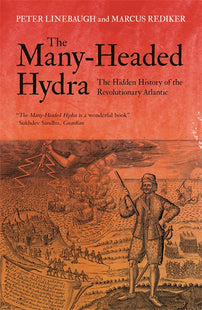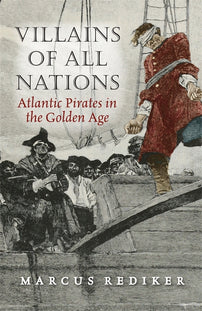The Latin American Hydra
Verónica Gago on Peter Linebaugh and Marcus Rediker’s classic history of maritime radicalism and how, to this day, it inspires fresh readings in different parts of the globe.

A version of this text was published in Jacobin América Latina
There are books whose pages plunge us into the deepest currents of history. This is undoubtedly the case of The Many-Headed Hydra: Sailors, Slaves, Commoners, and the Hidden History of the Revolutionary Atlantic, by American historians Peter Linebaugh and Marcus Rediker.
Inviting us to embark on a voyage, Linebaugh and Rediker introduce us to larger-than-life characters and narratives that, like a tidal movement, draw us towards another era, helping us along the way to see how the earth’s very movements and flows contain their own histories.
Nor is it by chance that aquatic terms like these seem to pile up when discussing Linebaugh and Rediker’s work. The history of the Atlantic, the water basin upon which was written the history of the sixteenth century, is itself the subterranean account of the origins of capitalism as a global regime connecting by waterways three separate continents: Europe, Africa, America. With their common zone in the Atlantic, it is precisely through this oceanic assembly that the capitalist economy is revealed for what is truly is: fully global from its inception.
But what actually happened in that blue space that shaped colonial globalization? Linebaugh and Rediker’s discovery is the following: the ocean is not a smooth surface of mere transit and circulation. It is a cartography upon which we can think about the foundations of the working-class condition on a global scale. The authors describe this working class condition as “hydric":
The hydra became a means of exploring multiplicity, movement, and connection, the long waves of planetary currents of humanity. The multiplicity was indicated, as it were, in silhouette in the multitudes who gathered at the market, in the fields, on the piers and the ships, on the plantations, upon the battlefields. The power of numbers was expanded by movement, as the hydra journeyed and voyaged or was banished or dispersed in diaspora, carried by the winds and the waves beyond boundaries of the nation-state.
The Atlantic is the formative site of a "multiethnic class”, which is itself the transnational foundation of capitalism understood as a regime of appropriation and conquest. Narrating this "motley" working class, the two historians explain, challenges both the common notions that circumscribe understandings of class within a nation-state framework while silencing the inaugural repression that came with the very constitution of the nation-form. Instead, The Many-Headed Hydra calls our attention back to the ship-bound formation of this early modern plebeian class.
In fact, it calls our attention to an even earlier story, one where the working class was formed through processes of expropriation and forced impoverishment: thrust into "liberated" labor through enclosure and dispossession in England and Ireland; criminalized by laws that protected private property and limited access to the commons; and sold into slavery in Africa and sent on to the Caribbean and the Americas; terrorized and stigmatized, as women were, by witch burnings and other inquisitorial methods.
[book-strip index="1" style="display"]Of course, if the ship represented a place of working-class convergence and gathering, it was also the antechamber to the plantation, that "prison without walls” where the harshness of piecework toil and confinement was experienced. Back in the waters though, that multilingual class formation took shape and nurtured a rebellious worldview, built from the bonds of cooperation among those who had been stripped of everything. There too, the proletarian dimension became near synonymous with the migrant condition, constituted in a double movement of displacement: dispossession and journey.
The Sea-Venture
The opening episode of The Many-Headed Hydra is itself worth recounting: the shipwreck of the Sea-Venture, in Bermuda in 1609. The passengers, soon-to-be plantation workers who were "owned" by the Virginia Company of London, survived the accident in a remarkable twist of fate. And the island upon which they landed turned out to be a sort of paradise of abundance where the marooned workers could make the most of their newly conquered freedom. They had, it turned out, stumbled upon the promised land.
Nor was that shipwreck a minor event. In fact, it had inflamed the political and literary imagination of all of Europe, serving as the "raw material” for no less than William Shakespeare's The Tempest, which premiered two years later in 1611. As Linebaugh and Rediker explain, that experiment in cooperation among sailors, laborers, artisans, peasants, slaves and Indians had reached the ears of Shakespeare via sailors in bars, eventually inspiring him create a conspiratorial slave called Caliban who, along with the jester Trinculo and the sailor Stephano, took possession of an island. Through a masterful use of archives, the authors thus show that the "European imagination” is not nearly as metaphysical or bookish as likes to think itself, and in fact is drenched with colonial cruelties:
Shakespeare knew the truth of the struggle for an alternative way of life on Bermuda, but he chose to turn a real place into a dreamy, literary ‘‘no-place,’’ a utopia. His fellow investors in the Virginia Company did something similar: against those who tried to seize a life of ‘‘plenty, peace, and ease,’’ they brutally pursued a utopia of their own.
Linebaugh and Rediker at other points focus on the laborers who laid the very infrastructure of expropriation: those who were put to work clearing forests or draining rivers and swamps, laboring to expel inhabitants and enclose the land in order to make it “productive”. There were also those who built the harbors and ships, and those who did the housekeeping. The authors thus reveal the interconnectedness of two key locations of transatlantic capitalism: the port and the plantation. In their treatment, Linebaugh and Rediker show how the port and plantation corresponded to a unique type configuration of city and countryside and, of course, to a specific type of river and maritime space connecting the two.
The Many-Headed Hydra is also a detailed account of how a modern labor force was formed out of the relentless application of gallows, prisons, bonfires, torture and other forms of terror. In fact, the merciless persecution of women, their forced conversion from "prophetesses to proletarians", the control of their reproductive capacities and stigmatization of all spirituality associated with the heretical practices of servants and maids, is very much at the center of Linebaugh and Rediker’s account.
This process has of course been brilliantly studied by Silvia Federici in her classic Caliban and the Witch, and it is little wonder her book is cited repeatedly by Linebaugh and Rediker. Nor is it a coincidence that Federici draws on Shakespearean characters to speak of the anti-colonial rebel Caliban as a global proletarian figure. Naturally, she goes one step further by also restoring the witch – otherwise relegated to the background of The Tempest– and tries to understand her figure as the embodiment of the insubordinate female that capitalism had to bend, bind and burn: all the heretics, healers, obeah women who poisoned their masters' food and inspired slaves to rebel, the women who led the trade guilds and who had to be put down before capitalism could take full flight.
The Hydra
The Many-Headed Hydra spans two and a half centuries while retracing less well known events, such as the Jamaican Maroon War (1720) and the New York Conspiracy (1741). Breaking down the theories and legislation that justified capitalist "prosperity", the book trains us to hear the concerted voices of "a hydra with a thousand heads”.
As Linebaugh and Rediker remind, it was Sir Francis Bacon who most fully formulated the idea of the monstrous hydra as a “multitude”, “the swarms, shoals, and routs” found in the “rural communes and urban mobs". Bacon’s secretary, the latter-day famous philosopher Thomas Hobbes, also drew on the myth of Hercules to demonize the rabble: even if a few heads are cut off, the polycephalic and revolutionary hydra will only multiply. Once more, political theory turns out to be in response to the multitudinous organizations pressing up from below.
The tradition of maritime radicalism, or “hydrarchy,” did not end at the shore’s edge. Linebaugh and Rediker explain its stubborn persistence in strikes, mutinies, slave rebellions and uprisings – events treated not as colorful, anecdotal one-offs, but as weighty historical moments that intervened in the very course of colonization.
[book-strip index="2" style="display"]In short, The Many-Headed Hydra is story about the becoming of the proletariat as a multiple subject, affected by dispossession and violence but carried forward on a rebellious spirit, finding ways to reinvent itself despite centuries of capitalist colonial terror. This method of giving names to anonymous stories also recalls Marx and Engels in The German Ideology, where they too evoked the men and women expropriated by the English enclosure movement with the term “motley crew” (generally translated into Spanish as "cuadrilla variopinta"). In a paragraph that exhibits the subtlety of their pen and the brilliance of their method, Linebaugh and Rediker trace the origins of the expression:
‘Motley’’ was a multicolored garment, often a cap, worn by a jester who was permitted by the king to make jokes, even to tell the truth, to power. As an insignium, the motley brought carnivalesque expectations of disorder and subversion, a little letting-off of steam. By extension, motley could also refer to a colorful assemblage, such as a crowd of people whose tatterdemalion dress made it interesting. A motley crowd might very likely be one in rags, or a ‘‘lumpen’’-proletariat (from the German word for ‘‘rags’’). Although we write about and emphasize the inter- racial character of the motley crew, we wish that readers would keep these other meanings—the subversion of power and the poverty in appearance— in mind.
Here, as in so many points in history, clothes are a marker that disqualifies: from the sans-culottes, to Argentina’s working-class descamisados (shirtless) or women in skirts, political identity and attire are closely connected.
Ch’ixi
In Linebaugh and Rediker’s exemplary "history from below”, we also detect clues for how to read our own present. After all, the scaffolding that support the global dimension of contemporary capitalism seems to habitually remind us of its violent origins. In fact, in the twenty plus years that have passed since the publication of The Many-Headed Hydra, we can still see, amid successive waves of global crises and new forms of protest, the consolidation of an increasingly "motley" proletariat, both in its modalities and organizational trajectories.
My research around what I called "neoliberalism from below" is itself an oblique dialogue with Linebaugh and Rediker: an attempt to think about the dynamics of exploitation, cooperation and resistance of popular economies against the backdrop of the persistent conditions of neoliberalism in Latin America. In my work, I analyze the pluralization of neoliberalism by practices "from below": how neoliberalism articulates with community forms, popular tactics for “getting by”, the activities that make up the informal networks and reproductive schemes that in turn plug into an existing social vitality. These practices together reveal the heterogeneous, contingent and ambiguous way in which sometimes overlapping dynamics of obedience and autonomy are constantly contesting the neoliberal condition.
The Many-Headed Hydra is also at home within broader Latin American debates: for example, we might consider the notion of abigarramiento, translated into Aymara as ch'ixi and developed by Silvia Rivera Cusicanqui. The abigarrado or ch’ixi is, simply put, just another declension of the English motley.
In fact, the connections are legion. Consider, for example, the works of Argentine historian Enrique Tandeter or Bolivian sociologist René Zavaleta Mercado: both in different ways have focused on the mining question in Latin America and are crucial contributors to a growing anti-colonial archive linking labor force and extractivism. Tandeter’s Coacción y mercado. La minería de la plata en el Potosí colonial, 1692-1826, is a remarkable analysis of the Potosí mining trade under the Viceroyalty of Peru and later of the Río de la Plata. In short, Tandeter’s originality was in linking Potosí’s cycles and productivity with forced labor practices. Zavaleta Mercado also investigated mining production and the organization of workers, trying to grasp the "strata" that made up the variegated nature of a society like the Bolivian, where the wage relationship was never hegemonic.
Both perspectives draw connections between extractive practices and the working class as it existed outside wage-earning and industrial frameworks, along the way challenging most of the existing approaches to the study of extractive phenomenon. In the case of Tandeter, indigenous labor coercion, as the driving motor behind the formation of a native labor force, is inseparable from entrepreneurialism, while the relationship between extraction and Latin American political constitution formed the central focus of Zavaleta Mercado’s studies. The concept of abigarrado, which Zavaleta Mercado suggested to think the coexistence of diverse social temporalities and organizational principles, was inspired by the technical description of the seams of the mine.
Today, these lineages of thought, in alliance with feminist struggles, provide some of the sharpest critiques of extractivism. Moreover, they show that, like maritime radicalism, a “history from below" of the planetary mine is waiting to be written. And to do so, it is necessary to cultivate the practice of listening, of appreciating lateral gestures, failed rebellions as well as collective conquests, just as Linebaugh and Rediker have done and continue to do.
[book-strip index="3" style="display"]




